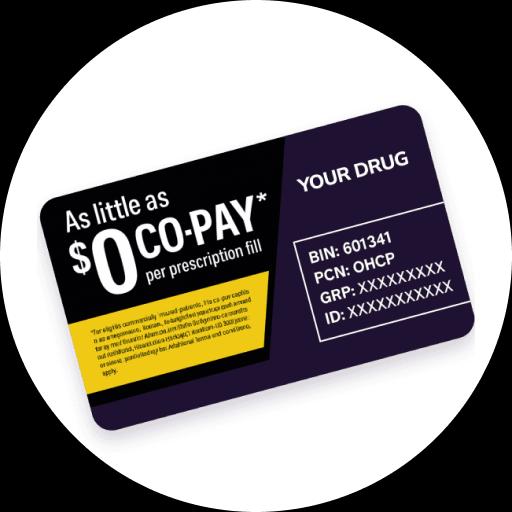Progesterone - Save Up to 90% with Coupons, Discounts & Assistance Programs
We found the following savings options for Progesterone. Compare Rx discount cards, drug coupons, patient assistance programs, Canadian online pharmacy prices, and telehealth options side by side. Pay as little as $0 per fill at 65,000+ pharmacies. Works whether you're insured, uninsured, or underinsured.


Start Saving Today!
Lower the Cost of Your Progesterone Prescription
More great savings
View Related Brands
MEDICAL INFORMATION
Progesterone Key Facts
What dosages is Progesterone available in?
Progesterone is available as 100 mg and 200 mg oral capsule.
What is Progesterone used for?
Progesterone is a Progesterone that is used to treat a lack of menstrual periods due to hormone imbalance.
How does Progesterone work?
Progesterone contains the hormone Progesterone. It regulates menstrual periods by helping to balance the natural levels of the hormone Progesterone in the body. When taken together with estrogen-containing medications, it helps protect the uterus from the damage caused by estrogen.
How do I take Progesterone?
Progesterone is typically taken as 200 mg to 400 mg by mouth once a day at bedtime. Your length of therapy will depend on the condition being treated.
Is it safe for me to take Progesterone?
Progesterone is a safe and effective treatment when used for FDA licensed indications. However, like all medications, they may give you unwanted side effects. You should always discuss potential side effects with your physician to ensure the medication is suitable and right for you. Progesterone should not be used in women with any of the following conditions:
- Progesterone should not be used in patients with known hypersensitivity to its ingredients. Progesterone contain peanut oil and should never be used by patients allergic to peanuts
- Undiagnosed abnormal genital bleeding
- Known, suspected, or history of breast cancer
- Active deep vein thrombosis, pulmonary embolism or history of these conditions
- Active arterial thromboembolic disease (for example, stroke and myocardial infarction), or a history of
these conditions - Known liver dysfunction or disease.
- Known or suspected pregnancy
Progesterone Common Side Effects
Common side effects of Progesterone:
- Headache
- Breast tenderness
- Joint pain
- Depression
- Dizziness
- Stomach bloating
- Hot flashes
- Trouble urinating
- Stomach pain
- More vaginal discharge than usual
Progesterone Serious Side Effects
Serious side effects are rare with Progesterone. Contact your healthcare provider immediately if you experience any of the following.
- Allergic reactions: trouble breathing, hives, swelling of your face, lips, tongue, or throat
- Heart attack: Chest pain or tightness, pain that radiates up to your shoulder, arm, neck, or jaw
- Stroke: Sudden trouble talking, trouble walking, or numbness on one side of your body or face
- Shortness of breath
- Sudden, severe headaches
- Breast lumps or pain
- Unusual or heavy vaginal bleeding
Effects of other drugs, drug classes and over-the-counter products on Progesterone
The following medications may interact with Progesterone:
- The metabolism of Progesterone was inhibited by ketoconazole. Ketoconazole is a known inhibitor of cytochrome P450 3A4, hence these data suggest that ketoconazole or other known inhibitors of this enzyme may increase the bioavailability of Progesterone
Who makes Progesterone?
Various FDA-approved generic manufacturers
Is Progesterone safe in pregnancy?
Progesterone should not be used during pregnancy.
What is the brand name for Progesterone?
Medical Disclaimer
NowPatient has taken all reasonable steps to ensure that all material is factually accurate, complete, and current. However, the knowledge and experience of a qualified healthcare professional should always be sought after instead of using the information on this page. Before taking any drug, you should always speak to your doctor or another qualified healthcare provider.
The information provided here about medications is subject to change and is not meant to include all uses, precautions, warnings, directions, drug interactions, allergic reactions, or negative effects. The absence of warnings or other information for a particular medication does not imply that the medication or medication combination is appropriate for all patients or for all possible purposes.
OUR CUSTOMERS VIEW
What Customers Love About Our Service
We want everyone to be happy and healthy, that’s what keeps us going. Read what some of them have to say about us.
Medicines Experts
Meet Our Medical Team
We are a broad skilled and passionate group of clinicians with experience of operating in health systems in the United Kingdom & United States. Providing excellent care and advice is at the heart of everything we do. You can read more about our medical team by visiting the medical team page or learn more about how we curate content by visiting our editorial process

























